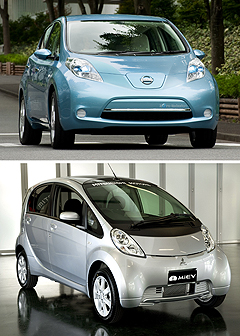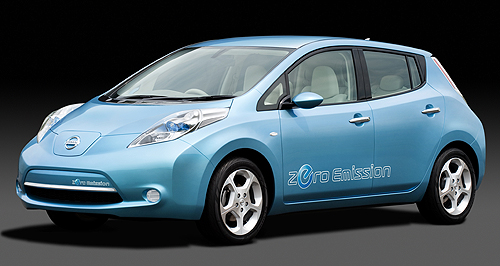Make / Model Search
Future models - Nissan - LeafNissan Leaf priced at $38,534 in UKPrice leader: Nissan's Leaf attracts an $8257 price subsidy in Britain. British Nissan EV price undercuts Mitsubishi i-MiEV sticker by 30 per cent18 May 2010 By MARTON PETTENDY and RON HAMMERTON NISSAN will launch its all-electric Leaf in the UK in February at a price 30 per cent cheaper than the rival Mitsubishi i-MiEV that is set to debut one month earlier. The five-seat, five-door plug-in Nissan hatch will enter British showrooms at £23,534 ($A38,534), about £10,165 ($A16,819) cheaper than the £33,699 ($A55,696) Mitsubishi i-MiEV. The prices of both cars include the British government’s generous £5000 ($A8257) price subsidy, which is one of the main reasons the UK was selected for the European debut of the pioneering EV, along with the Netherlands, Ireland and Portugal. Nissan says it plans to price the Leaf under €30,000 ($A42,364) in most European countries, making it comparable with similarly equipped diesel or hybrid vehicles. Without the government incentive, the Nissan Leaf would be priced at £28,350 ($A46,816) in Britain, pointing to a price above $50,000 when the vehicle lobs in Australia in 2012. Nissan Australia’s head of corporate communications, Jeff Fisher, described the British pricing for Leaf as attractive, saying the UK government and other bodies such as the City of London were demonstrating strong leadership in encouraging zero-emissions transport. He said Nissan Australia was continuing its collaborative efforts in the Australian motor industry to attract the attention of the federal government and community to the benefits of making zero-emissions vehicles attractive to the buying public. While Nissan Australia has discussed EV recharging infrastructure issues with city councils in Sydney and Melbourne, the Australian government has so far ruled out price incentives for green vehicles, instead favouring grants to local car manufacturers to invest in environmentally friendly vehicles under the Green Car Innovation Fund. In the UK, all zero-emissions car qualify for a subsidy of 25 per cent of purchase price up to a total of £5000. As well, these vehicles are exempt from road tax, and qualify for first-year capital allowances for fleet vehicles and zero-in-kind company car tax. As well, domestic electricity used to charge cars has a lower rate of value added tax (VAT), and such cars are exempt from London’s congestion charge at an estimated saving of up to £2000 a year.  Nissan UK will start taking orders on its website in July for the five-seat Leaf hatchback, which the company says will feature air-conditioning, satellite-navigation, parking camera, quick-charge socket and innovative smart-phone connectivity. Nissan UK will start taking orders on its website in July for the five-seat Leaf hatchback, which the company says will feature air-conditioning, satellite-navigation, parking camera, quick-charge socket and innovative smart-phone connectivity.In the US, federal tax credits of $US7500 ($A8560) will lower the Leaf's retail price to about 10 per cent more than that of Toyota's Prius hybrid, tax credits for which have been phased out. In California, generous state credits could reduce the Leaf price to $US20,280 ($A23,150). In an apparent swipe at the pricing of Mitusbishi's smaller i-MiEV, Nissan International SA senior vice-president of sales and marketing Simon Thomas said Nissan would be the first auto-maker to offer an affordable zero-emissions car. “It’s (Leaf) a pure electric vehicle, with no tailpipe emissions and very low running costs,” he said. “Nissan Leaf may look similar to a compact family car, but its smoothness, acceleration and handling will surprise and impress drivers and passengers alike.” The Leaf – powered by 24kWh lithium-ion batteries feeding an 80kW/280Nm electric motor – will go into production later this year in Japan, where it will go on sale first in December. Limited sales will also take place this year in the US and Europe, where the Leaf will be released first in Portugal and the Netherlands, followed by the UK and Ireland in February 2011. The US island state of Hawaii will also be one of the earliest export markets. The pro-green state government and compact nature of the archipelago – well suited to short-range EVs – is seen as a good proving ground for the Leaf in the US. Apart from Japan, the Leaf will also be built in the US and the UK, where Toyota's new locally built Corolla-based Auris Hybrid goes on sale in July, priced from £18,950 ($A31,300) on the road. UK production of the first EV from a major car-maker will start in 2013. Last week, CEO Carlos Ghosn said Nissn had received more than 13,000 orders for the Leaf in the US and Japan, and was looking to boost production given it has capacity to produce less than 12,000 units by next March. Nissan hopes to sell 50,000 examples in 2012, when the Leaf is released globally. Earlier this month, Nissan said it had logged more than 8000 Leaf orders in North America in its first two weeks on sale, and was "well on its way" to attracting 25,000 US orders by the end of this year, despite launching initially only in a handful of US states. Pre-orders in Japan totalled 3754 in three weeks after Nissan launched its unique Leaf pre-order process on April 1, representing more than half of the company's FY2010 Japanese sales target of 6000 vehicles. In late April, Nissan said 64 per cent of Leaf pre-orders in Japan came from private individuals, with those aged over 60 accounting for 35 per cent, followed by those in their 50s (26 per cent) and 40s (24 per cent). Nissan, whose sister company Renault is also planning four EVs - the first of which is expected to go on sale next year - has forecast that EVs will comprise 10 per cent of global new-car sales by 2020. However, a US study by Deloitte Consulting last week said the high cost and limited range will prevent EVs accounting for more than two to five per cent of US car sales in a decade. Deloitte has forecast the cost of lithium-ion batteries will fall by 40 per cent over the next four years, from about $US1000 per kiloWatt hour currently to $US600 in 2014. Also key to EV affordability are government subsidies, which Nissan has warned will begin to be phased out when many current government commitments expire in three years. “There’s no obligation for governments to extend those programs beyond the definitive agreement, and in some countries we don’t have a definitive agreement,” said Mr Thomas in London, where Leaf pricing was announced. Nissan has said it will eventually have the capacity to produce batteries for 500,000 EVs per annum, while Volkswagen has forecast EVs on German roads to number one million by 2020. However, last month in Germany, where VW recently revealed its ambitious EV model rollout, led by the Golf from 2013, as part of the government's EV roadmap, an environmental group said EV incentives will “plunder” government treasuries and do little to reverse global warming. “A lot of money is going to be handed out to support electric cars instead of implementing tougher carbon-dioxide emissions (regulations) and making gasoline and diesel cars more efficient,” said Juergen Resch, from the Berlin-based environmental organisation Deutsche Umwelthilfe.  Read moreAll future modelsMotor industry news |
Click to shareNissan modelsResearch Nissan All future modelsMotor industry news |



 Alfa Romeo
Alfa Romeo Abarth
Abarth Audi
Audi Aston Martin
Aston Martin BMW
BMW Bentley
Bentley Ferrari
Ferrari Chevrolet
Chevrolet Ford
Ford Fiat
Fiat GWM
GWM Foton
Foton Hyundai
Hyundai Honda
Honda Jaguar
Jaguar Isuzu
Isuzu Kia
Kia Jeep
Jeep Land Rover
Land Rover Lamborghini
Lamborghini Maserati
Maserati Lexus
Lexus McLaren
McLaren Mazda
Mazda Mercedes-Benz
Mercedes-Benz Mitsubishi
Mitsubishi Mini
Mini Peugeot
Peugeot Nissan
Nissan Ram
Ram Porsche
Porsche Rolls-Royce
Rolls-Royce Smart
Smart Skoda
Skoda Suzuki
Suzuki Subaru
Subaru Toyota
Toyota Tesla
Tesla Volvo
Volvo Zeekr
Zeekr







Facebook Twitter Instagram